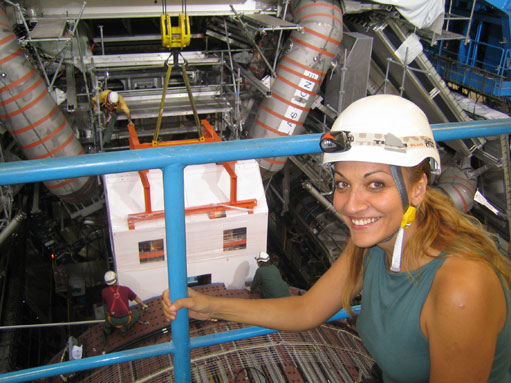
ATLAS e-News
23 February 2011
2 June 2008
Sofia Chouridou
Nationality: Greek
 Sofia Chouridou
Sofia Chouridou
As the 2008 Summer Student Program is just about to start, here is an example of how the Program is successful at bringing talented physics students into the field of particle physics: “The CERN summer school changed my life,” says Sofia Chouridou, a Greek physicist working on the SCT at ATLAS. Since Sofia first came to CERN in 1995 while enrolled in Physics at the University of Thessaloniki, she always wanted to work in the biggest particle physics lab in the world.
Sofia was seduced by CERN’s top facilities, excellent seminars and high-level experts, who are at hand for students to have stimulating discussions with. She also liked the excellent atmosphere during the summer school: “We worked really hard, but we also had great fun,” she remembers.
Before coming to CERN, Sofia pursued her interest for particle physics in Germany, where she did her PhD at the University of Munich. For her thesis, she studied a high precision method of calibration of the wire positions in the Muon Chambers of the ATLAS detector. The Greek physicist believes that changing countries for studies or research is a very good exercise for scientists: “Living abroad pushes you to learn new things and meet new people constantly, just like in science itself.”
In 2002, Sofia made her dream of working at CERN come true when she joined the lab as a CERN fellow. After the fellowship, she joined the University of California Santa Cruz group, and is now working with the team in charge of testing, integrating and commissioning the individual modules of the SCT.
Sofia likes to share her knowledge of Physics and the excitement of the projects at CERN. As such, she is keen on participating in outreach activities, like being a guide of ATLAS in the Open Day and in other occasions: “I believe it is very positive to inform the general public about what we do here at CERN, what we are trying to discover and how our projects aim at understanding the world we live in better.” Once the public has more information about all this, Sofia is confident that the rumours about the danger of the experiments at CERN that a few individuals are trying to spread will have no credibility any more.
In other outreach activities, Sofia also enjoys interacting with journalists and the media. She has participated in TV programmes for Greek television and has been interviewed by reporters with Swiss and Greek magazines: “We all know the power of the media. Therefore it’s necessary that we physicists inform the media well about our work.” In her collaborations with the media, she has talked about ATLAS and the reason why the LHC is being built and also about general physics, like the Big Bang theory.
As with the rest of the particle physics scientific community, Sofia is looking forward to the switching on of the LHC. She is getting ready for physics as a member of the Standard Model group, Sofia calls herself “a Higgs fan” and she supports the existence of the particle that will complete the Standard Model.
For Sofia, research in particle physics has turned out to be as exciting and inspiring as she initially thought before pledging allegiance to the field. With no regrets about her choice of career, she also acknowledges that a career in this field, in science in general, can be hard some times, but she does not hesitate to encourage students to take on the challenge: “If you have a dream, you have to go for it.” This is what Sofia has been doing so far.
